
-
 One of the most original and provocative books of the past decade is Disciplined Minds by Jeff Schmidt. “A critical look at salaried professionals,” says the cover, “and the soul-battering system that shapes their lives.” Its theme is postmodern America. But it also applies to Britain, where the corporate state has bred a new class of Americanised manager to run the private and public sectors: the banks, the main parties, corporations, important committees, the BBC.
One of the most original and provocative books of the past decade is Disciplined Minds by Jeff Schmidt. “A critical look at salaried professionals,” says the cover, “and the soul-battering system that shapes their lives.” Its theme is postmodern America. But it also applies to Britain, where the corporate state has bred a new class of Americanised manager to run the private and public sectors: the banks, the main parties, corporations, important committees, the BBC. -
ZCommunications received the following open letter from indpendent filmmaker and journalist John Pilger reporting very disturbing events in progress. Visit www.johnpilger.com for more of Pilger's work. * * * Dear Noam...
-
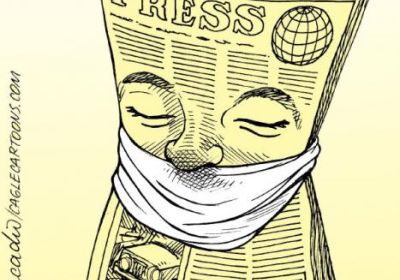 The illegal eavesdropping on famous people by the Rupert Murdoch-owned British tabloid News of the World is said to be Murdoch’s Watergate. But is it the crime by which Murdoch ought to be known? In his native land, Australia, Murdoch controls 70% of the capital city press. Australia is the world’s first “murdochracy”, in which smear by media is power. The most enduring and insidious Murdoch campaign has been against the Aboriginal people, who were dispossessed by the arrival of the British in the late 18th century and have never been allowed to recover.
The illegal eavesdropping on famous people by the Rupert Murdoch-owned British tabloid News of the World is said to be Murdoch’s Watergate. But is it the crime by which Murdoch ought to be known? In his native land, Australia, Murdoch controls 70% of the capital city press. Australia is the world’s first “murdochracy”, in which smear by media is power. The most enduring and insidious Murdoch campaign has been against the Aboriginal people, who were dispossessed by the arrival of the British in the late 18th century and have never been allowed to recover. -
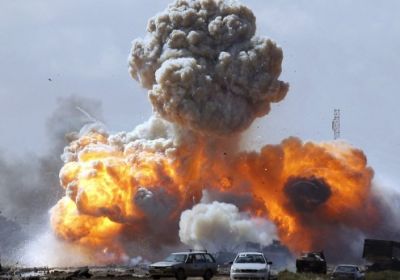 The Euro-US attack on Libya has nothing to do with protecting anyone; only the terminally naive believe such nonsense. It is the West’s response to popular uprisings in strategic, resource-rich regions of the world and the beginning of a war of attrition against the new imperial rival, China. US President Barack Obama’s historical distinction is now guaranteed. He is the US’s first black president to invade Africa.
The Euro-US attack on Libya has nothing to do with protecting anyone; only the terminally naive believe such nonsense. It is the West’s response to popular uprisings in strategic, resource-rich regions of the world and the beginning of a war of attrition against the new imperial rival, China. US President Barack Obama’s historical distinction is now guaranteed. He is the US’s first black president to invade Africa. -
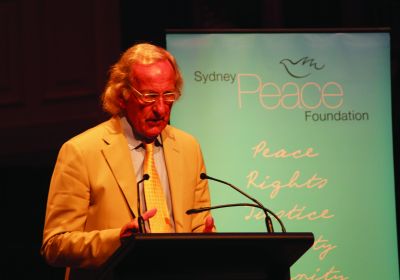
The public forum “Breaking Australia's silence: WikiLeaks and freedom” took place on March 16 at Sydney Town Hall. More than 2000 people attended. The event was staged by the Sydney Peace Foundation, Amnesty, the Sydney Stop the War Coalition, and supported by the City of Sydney.
-

When you fly over the earth’s oldest land mass, Australia, the view can be shocking. Scars as long as European countries are the result of erosion. Salt pans shimmer where once native vegetation grew. This is almost impossible to reverse.
-
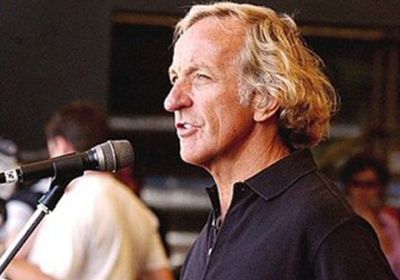 In the US Army manual on counterinsurgency, the American commander General David Petraeus describes Afghanistan as a “war of perception... conducted continuously using the news media”. What really matters is not so much the day-to-day battles against the Taliban as the way the adventure is sold in America where “the media directly influence the attitude of key audiences”. Reading this, I was reminded of the Venezuelan general who led a coup against the democratic government in 2002. “We had a secret weapon,” he boasted. “We had the media, especially TV. You got to have the media.”
In the US Army manual on counterinsurgency, the American commander General David Petraeus describes Afghanistan as a “war of perception... conducted continuously using the news media”. What really matters is not so much the day-to-day battles against the Taliban as the way the adventure is sold in America where “the media directly influence the attitude of key audiences”. Reading this, I was reminded of the Venezuelan general who led a coup against the democratic government in 2002. “We had a secret weapon,” he boasted. “We had the media, especially TV. You got to have the media.” -
 “Rise like lions after slumber/In unvanquishable number!/Shake your chains to earth, like dew/Which in sleep had fall’n on you/Ye are many —they are few.” These days, the stirring lines of Percy Shelley’s “Mask of Anarchy” from 1819 may seem unattainable. I don’t think so. Shelley was both a Romantic and political truth-teller. His words resonate now because only one political course is left to those who are disenfranchised and whose ruin is announced on a British government spreadsheet.
“Rise like lions after slumber/In unvanquishable number!/Shake your chains to earth, like dew/Which in sleep had fall’n on you/Ye are many —they are few.” These days, the stirring lines of Percy Shelley’s “Mask of Anarchy” from 1819 may seem unattainable. I don’t think so. Shelley was both a Romantic and political truth-teller. His words resonate now because only one political course is left to those who are disenfranchised and whose ruin is announced on a British government spreadsheet. -
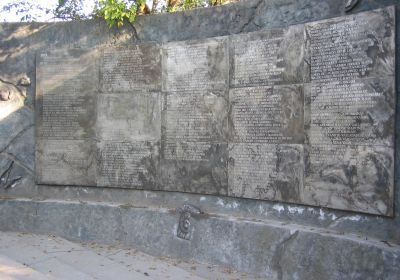 The rescue of 33 miners in Chile on October 14 is an extraordinary drama filled with pathos and heroism. It is also a media windfall for the Chilean government, whose every beneficence is recorded by a forest of cameras. One cannot fail to be impressed. However, like all great media events, it is a facade. The accident that trapped the miners is not unusual in Chile and the inevitable consequence of a ruthless economic system that has barely changed since the dictatorship of General Augusto Pinochet.
The rescue of 33 miners in Chile on October 14 is an extraordinary drama filled with pathos and heroism. It is also a media windfall for the Chilean government, whose every beneficence is recorded by a forest of cameras. One cannot fail to be impressed. However, like all great media events, it is a facade. The accident that trapped the miners is not unusual in Chile and the inevitable consequence of a ruthless economic system that has barely changed since the dictatorship of General Augusto Pinochet. -
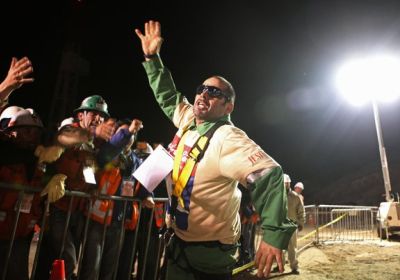
The rescue of 33 miners in Chile is an extraordinary drama filled with pathos and heroism. It is also a media windfall for the Chilean government, whose every beneficence is recorded by a forest of cameras. One cannot fail to be impressed. However, like all great media events, it is a facade. The accident that trapped the miners is not unusual in Chile and is the inevitable consequence of a ruthless economic system that has barely changed since the dictatorship of Gen. Augusto Pinochet. Copper is Chile's gold, and the frequency of mining disasters keeps pace with prices and profits.
-
 Britain is said to be approaching its Berlusconi Moment. That is to say, if Rupert Murdoch wins control of Sky, he will command half Britain’s television and newspaper market and threaten what is known as public service broadcasting. Although the alarm is ringing, it is unlikely that any government will stop him while his court is packed with politicians of all parties. The problem with this and other Murdoch scares is that, while one cannot doubt their gravity, they deflect from an unrecognised and more insidious threat to honest information.
Britain is said to be approaching its Berlusconi Moment. That is to say, if Rupert Murdoch wins control of Sky, he will command half Britain’s television and newspaper market and threaten what is known as public service broadcasting. Although the alarm is ringing, it is unlikely that any government will stop him while his court is packed with politicians of all parties. The problem with this and other Murdoch scares is that, while one cannot doubt their gravity, they deflect from an unrecognised and more insidious threat to honest information. -
 The year before England won the 1966 World Cup, I interviewed its captain, Bobby Moore. Having not long arrived in England from the antipodes, where “soccer” was a minority sport beloved by Italians and Croats, I did not have a clue about the game. Nevertheless, I had been assigned to write a “human interest” piece on the West Ham star by the same convivial assistant editor who had hired me believing I could play cricket, because I was Australian, and so assist the Daily Mirror team in its grudge match against the Express.
The year before England won the 1966 World Cup, I interviewed its captain, Bobby Moore. Having not long arrived in England from the antipodes, where “soccer” was a minority sport beloved by Italians and Croats, I did not have a clue about the game. Nevertheless, I had been assigned to write a “human interest” piece on the West Ham star by the same convivial assistant editor who had hired me believing I could play cricket, because I was Australian, and so assist the Daily Mirror team in its grudge match against the Express.